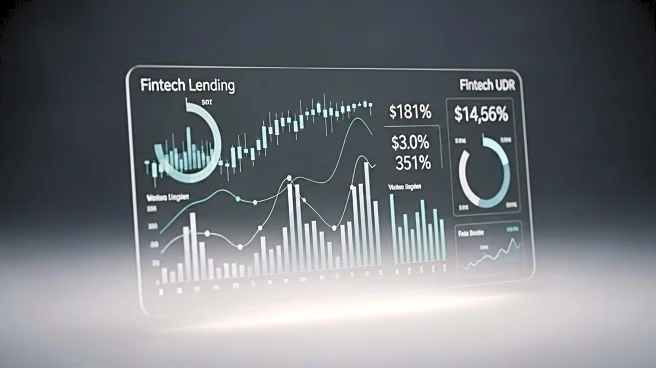What's Happening?
In 2025, fintech lenders are transforming the landscape of installment loans by removing traditional barriers and offering more accessible options to borrowers. These lenders are utilizing dynamic risk models that adjust in real-time based on a borrower's financial behavior, such as early bill payments and increased savings. This approach rewards positive financial habits with better rates and larger loan amounts. Fintech platforms are also embedding lending products directly within digital wallets and personal finance tools, allowing users to manage loans alongside their spending data without the need for multiple apps or logins. This digital-first experience streamlines the approval process by relying on direct access to bank data and real-time cash flow, eliminating the need for physical documents and lengthy processing times.
Why It's Important?
The shift towards fintech-driven installment loans is significant as it democratizes access to credit, particularly for individuals with limited credit histories or irregular income. By focusing on real-time affordability and responsible borrowing habits, fintech lenders are providing more people with the tools to manage their finances effectively. This evolution in lending practices is reshaping the credit industry, offering greater transparency and flexibility in repayment options. Borrowers can choose repayment schedules that align with their income, reducing the likelihood of missed payments and enhancing financial control. The integration of lending products within digital wallets and personal finance tools further simplifies the borrowing process, making it more accessible and manageable for users.
What's Next?
As fintech lenders continue to innovate, the focus will likely remain on expanding access to credit and enhancing user experience. The use of AI and automation in income verification and identity checks is expected to increase, further speeding up approval processes and reducing defaults. Fintech platforms may also continue to refine their dynamic scoring models, offering more personalized lending terms based on real-time borrower behavior. Additionally, regulatory compliance will remain a priority, with platforms integrating local and national lending laws into their processes to ensure transparency and trust. The ongoing evolution of installment loans is poised to empower more individuals to achieve financial stability and growth.
Beyond the Headlines
The transformation of installment loans by fintech lenders highlights broader shifts in the financial industry towards inclusivity and transparency. By assessing nontraditional metrics such as payment histories and savings habits, lenders are leveling the playing field for younger borrowers, gig workers, and those underserved by traditional banking. This approach not only opens doors for more people but also encourages responsible financial behavior by rewarding positive habits. The integration of financial education within lending platforms further supports users in understanding the impact of loans on their overall budget, fostering a more informed and empowered consumer base.











